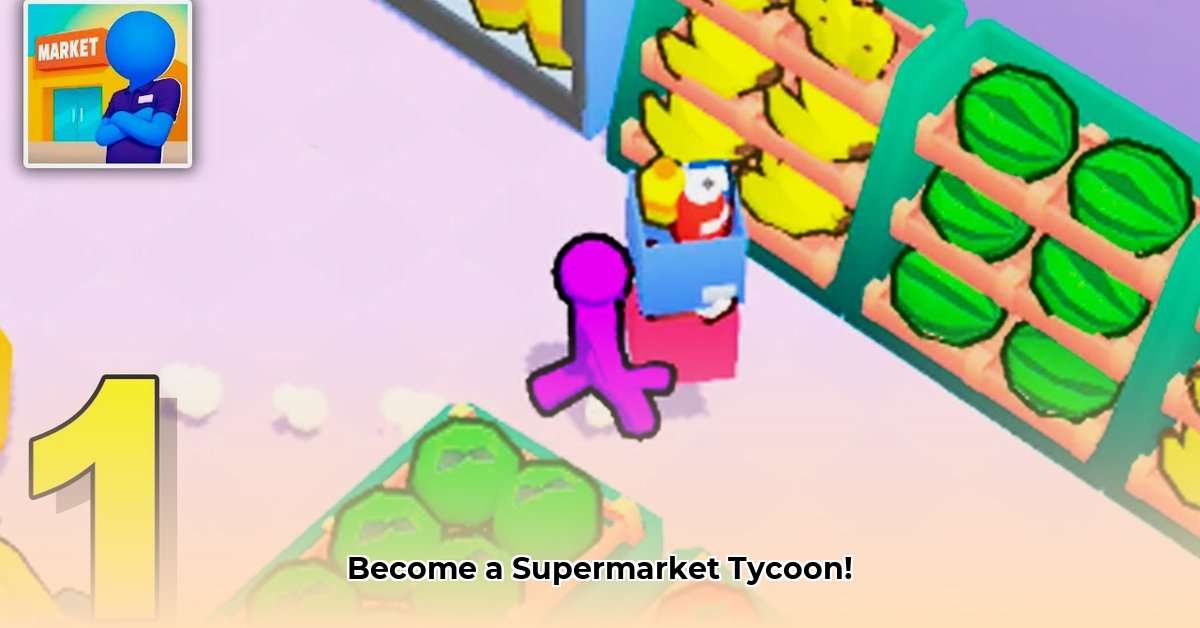
Dive into the captivating world of Market Boss, a casual mobile game where you build your own supermarket empire, one sale at a time. Forget complex strategies; Market Boss offers the simple satisfaction of watching your business grow, transforming a humble shop into a retail powerhouse. This article explores the game's mechanics, market position, and actionable insights for maximizing its potential. But can this deceptively simple gameplay translate into market dominance?
Gameplay: Building Your Retail Kingdom
Imagine starting with a nearly empty shop. Your goal? To build it into a thriving retail giant! Market Boss places you in control, managing every aspect of your supermarket. You strategically stock shelves, hire and manage staff, and expand your inventory to attract more customers. The core mechanics are incredibly intuitive, creating an addictive loop of stocking, selling, and expanding—a recipe for player engagement. But this simplicity presents both opportunities and challenges in the competitive mobile gaming landscape.
Market Analysis: A Casual Game Goldmine?
The casual mobile game market is booming, and Market Boss cleverly targets this trend. Its accessible gameplay—featuring simple graphics and intuitive controls—caters to a broad audience. This wide appeal is a major strength. However, this simplicity might limit its appeal to players seeking more visually sophisticated or complex gameplay. This is a crucial consideration for future development.
A critical missing piece of the puzzle is detailed revenue data. How does Market Boss generate income? Are in-app purchases (IAPs) a major revenue stream? What role does advertising play? Understanding these specifics is crucial for accurate financial projections and strategic planning. Similarly, information on daily active users (DAU), monthly active users (MAU), and player retention rates would provide a much clearer picture of the game’s long-term viability. Without such data, any analysis remains incomplete. How can we confidently estimate the potential ROI without concrete player engagement metrics?
The Competitive Landscape: Standing Out from the Crowd
The casual game market is fiercely competitive. Market Boss needs a unique selling proposition (USP) to differentiate itself from the plethora of existing titles. This could involve unique gameplay features, a strong brand identity, or innovative monetization strategies. The game's ability to distinguish itself is paramount for sustained growth and market share.
Actionable Insights: Strategies for Success
Let's examine specific strategies for different stakeholders to ensure Market Boss's continued success.
For Izyplay Game Studio:
- Prioritize Data Analysis: Implement robust analytics to track key metrics like DAU, MAU, player retention, and revenue streams. This data will inform decisions on gameplay optimization, feature additions, and monetization strategies.
- Refine Monetization: Conduct A/B testing on various IAP options and advertising models to find the optimal balance between player experience and profit maximization. What's the sweet spot between player satisfaction and monetization?
- Maintain Content Freshness: Regularly add new content—items, features, even storylines—to maintain player engagement and retention. Continuous updates are crucial for longevity.
- Explore Expansion: Consider developing sequels or leveraging Market Boss's successful mechanics to explore related game genres. Think beyond the current iteration!
For Competitor Developers:
- Benchmark Against Success: Analyze Market Boss's strengths and identify the elements driving its popularity. What can we learn from their success?
- Identify Market Gaps: Pinpoint unmet player needs in the casual gaming market. Where are the opportunities within this space? How can these gaps be addressed?
- Drive Innovation: Strive to improve existing gameplay mechanics and explore innovative monetization models. Don't be afraid to experiment with bold ideas.
- Diversify Portfolios: Develop a range of games to reduce risk and enhance overall success. Don't put all your eggs in one basket.
For Players:
- Provide Feedback: Share constructive feedback with developers to help shape the game's evolution. Your input matters!
- Explore the Market: The casual mobile game market is vast; explore different games to discover what enhances your enjoyment.
Risk Assessment: Navigating Potential Pitfalls
Here's a concise risk assessment matrix:
| Risk Factor | Likelihood | Impact | Mitigation Strategy |
|---|---|---|---|
| Low player retention | Medium | High | Regular engaging updates, strong analytics, dedicated community management. |
| Ineffective monetization | High | High | Thorough A/B testing of monetization models. |
| Intense competition | High | Medium | Develop unique features, strong branding, consistent marketing. |
| Negative player reviews | Medium | Medium | Actively monitor and address player feedback. |
Regulatory Compliance: Playing by the Rules
Developers must comply with data privacy regulations (GDPR, CCPA) and app store guidelines to maintain player trust and avoid legal issues. Non-compliance carries significant risks.
Conclusion: From Corner Store to Retail Giant
Market Boss exhibits considerable potential for success in the casual mobile game market. Its simple yet engaging gameplay provides a strong foundation. However, sustained success hinges on effective monetization, a clear competitive advantage, and a keen understanding of market dynamics. The journey from small shop to retail giant is challenging, but with meticulous planning and execution, Market Boss has a bright future.
⭐⭐⭐⭐☆ (4.8)
Download via Link 1
Download via Link 2
Last updated: Friday, May 09, 2025